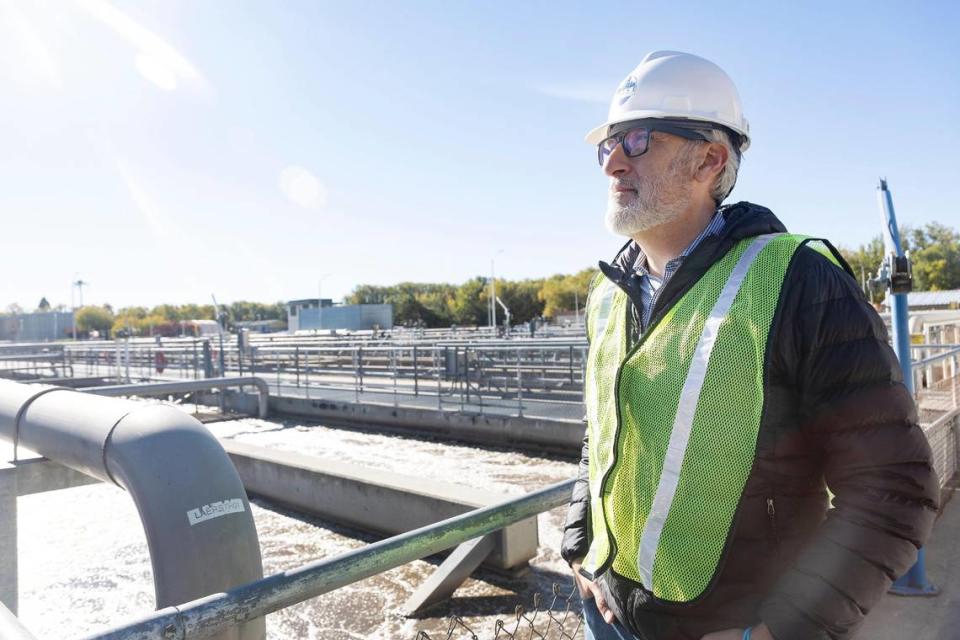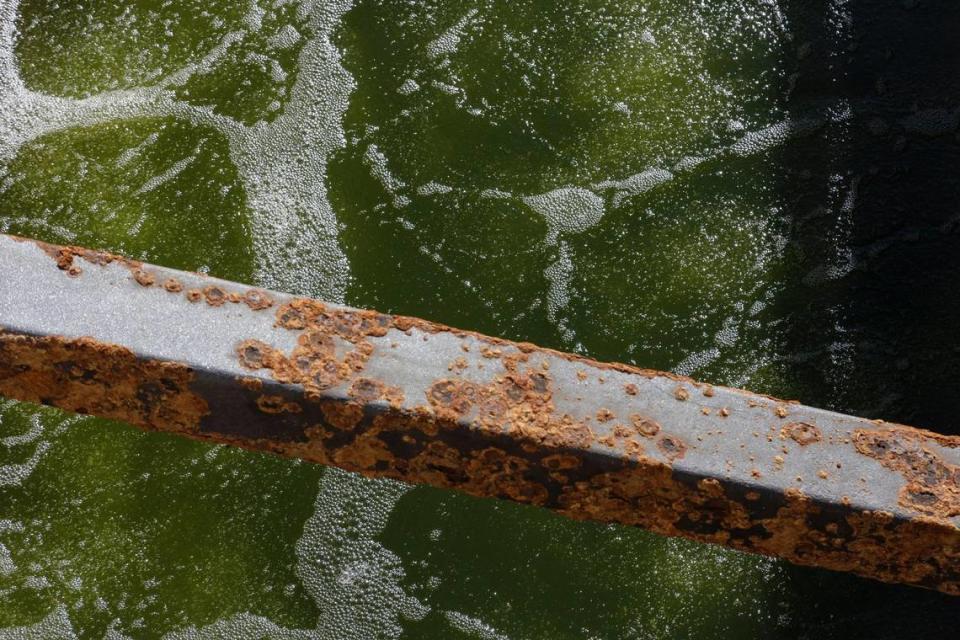Boise to voters on sewer rates: Pay 53% more now or 10% more for decades. Your choice
When the city of Boise first built what is now called the Lander Street Water Renewal Facility in 1949, residents overwhelmingly voted in favor of a $1.5 million bond to finance the plant’s construction.
Now, 73 years later, the city is once again asking residents to approve a sizable bond, this time for up to $570 million to repair and update the city’s aged sewage disposal system. And with Election Day just around the corner, the city and local advocates are trying to drum up support for the bond to avoid large rate increases for residents.
Public Works Director Steve Burgos said parts of the Lander plant are showing significant wear after constant work over several decades and need to be replaced. City officials say the plant has reached the end of its usefulness, and Boise’s wastewater treatment infrastructure needs nearly $1 billion in upgrades.
The bond would cover the scope of projects that City Hall has lined up in its Water Renewal Capital Improvement Plan, Burgos said. They include upgrades to the Lander plant, a recycled-water program, a third water-renewal plant in southeast Boise, and expanded capacity at the West Boise Water Renewal Facility north of Chinden Boulevard near Cloverdale Road.
Essentially, the bond is asking voters how they would like the project to be funded. If voters reject the bond, the city says it will need to make the upgrades anyway and pay for the projects using cash.
The Lander plant, located northwest of Veterans Memorial Parkway along the Boise River, treats 11 million gallons a day for more than 80,000 residents, Burgos said. Upgrades will allow it to treat up to 17 million gallons a day as demand increases along with the city’s population growth.
The West Boise Water Renewal Facility, the city’s other sewage treatment plant, was constructed in 1976, and the city estimates it will need to take up to 25 million gallons a day by 2040, which will require expansion too. Estimates suggest City Hall will spend north of $120 million on repairs and upgrades at the West Boise plant, although the degradation is not as severe as at the Lander plant.

Pipes under the Lander plant have corroded from exposure to waste and chemicals. Large chunks of stone have started chipping off the building. Four weeks ago, a pump developed a softball-sized hole and had to be shut down after sewage began pouring out of the system.
“We don’t want to operate the facility too long, so that it has some kind of catastrophic failure,” Burgos said, adding that the risk of failure is low for now. “We’re hitting that sweet spot right now.”
Project Manager Josh Baker said wastewater plants typically have a lifespan of 50 years, and harsh chemicals can wear down on a plant’s infrastructure over time.
Construction has already begun at Lander Street. A new building is being built right next to the current building, where 11 million gallons of wastewater are processed every day. The final fate of the original 1940s building is still unknown, Burgos said.
City Hall expects to spend about $904 million on all of its water renewal projects combined, according to the capital improvement plan.
To help offset some of the initial costs, the city is asking voters to approve up to $570 million of bond money to finance the repairs. The city would sell bonds backed by sewer-rate increases.
If the bond fails, city officials say, residents could see rates increase as much as 53% to pay for the upgrades, because the city would not be able to spread the costs of the work over the 30-year life of the bonds. That would mean an average $19 per month increase if the bond fails, compared with a 10% increase, about $4 per month, should the bond pass.
Boise homeowners pay an average monthly sewage bill of $36.82, Public Works says. They’re billed bimonthly, so the two-month average is $73.64. Should the bond pass, average monthly rate would increase to $40.62. If it fails, the rate would rise to $56.32.

The city says the bond will not affect property taxes, just sewage rates.
By comparison, Meridian residents pay an average monthly bill of $40.10 per on sewage, according to the city. Residents in Nampa, which approved a wastewater treatment bond in May 2018, have an average monthly bill of $44.18.
City spends money for public awareness
As the Nov. 2 election draws closer, City Hall has attempted to increase awareness of the bond. The city sent out mailers about the bond to all households with a registered voter in Boise, according to a spokesperson. Funding for the mailers came from a mixture of water renewal and general funds, although the city has not specified how much the mailers cost.
Meanwhile, local developer Clay Carley has launched a political action committee called “Yes for Clean and Affordable Water,” which encourages residents to support the bond. Carley said Mayor Lauren McLean reached out to him to chair the PAC , and he agreed to.
The committee has raised more than $40,000 in two weeks, including $10,000 from Micron, $1,000 from City Council Member Patrick Bageant, and thousands more from development companies, according to campaign finance reports.
Carley said developers would acutely feel the impact of a 53% rate increase and have an interest in supporting the bond to keep rates low.
“It looks a lot more clean if a city is using private donations to send this messaging out, rather than taxpayer money,” Carley said by phone.
McLean said at a recent news conference that the bond would keep rates affordable, providing the city’s water renewal infrastructure with much-needed updates while also providing environmental benefits.
That’s because part of the city’s water renewal plan includes a third wastewater treatment plant in Southeast Boise, which is expected to handle about 5 million gallons per day primarily from manufacturing in the area. Burgos said the plant’s exact location has not been determined and will be decided after multiple rounds of community discussion.
It will treat water from these operations and provide recycled water back to these customers to use again. It would also pump water to replenish the city’s aquifer, Burgos said.
“We are planning for drier years in the future, so we want to make sure that our water is renewable so that we have enough water in the long run,” McLean said.
Natalie Monro, the city’s public works spokesperson, said recycled water will not be delivered to homes.
Not everyone is on board. At a recent forum hosted by the City Club of Boise and the League of Women Voters of Idaho, multiple candidates said they would vote against the bond, arguing the issue needed more public input and discussion before going to a vote. District 1 candidate Luci Willits said many residents don’t know there is an election, let alone specific details of a city bond. District 1 encompasses West Boise.
“My experience in government is sometimes you have to fail at the beginning to retool to get a better policy and a better outcome,” Willits said.
Greg MacMillan, a candidate in District 3, said he would like the city to “explore all options” before proceeding with the bond. District 3 includes the North End, Veterans Park and Collister neighborhoods.

McLean said the city has not completed any surveys to gauge public support for the bond proposal. The city has said it’s taken thousands of hours in public testimony on the Lander Street Facility in recent years.
Monro said repairs will take place no matter what voters decide on Nov. 2. In essence, what voters will decide on is not the extent of the repair, but how the city will pay for it.
Early voting started Oct. 18 and continues through Oct. 29. Election Day is on Nov. 2.
Have questions about the water renewal bond? Send them to kland@idahostatesman.com.

 Yahoo Finance
Yahoo Finance 